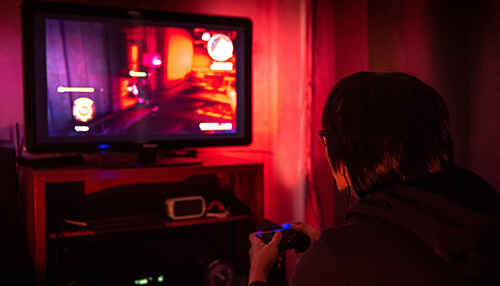Much has been said about detrimental effects of video games on people’s cognitive functions, mental health, and productivity. Still, it would be fair to note that such negative effects normally occur when players fail to maintain a healthy gaming-life balance. As an avid gamer, you might not want to say goodbye to your lifelong hobby and miss out on the new titles that regularly hit the market. At the same time, you might be wary about devoting your precious time to video games, which are believed to be huge distractions getting in the way of your successful learning. But is playing video games really that dangerous? Can video games actually boost your inherent capacities and make you a more efficient learner? Well, they certainly can. It’s a proven fact that video games have lots of benefits that might make your college life easier and more enjoyable. And it’s about time you learned about them!
Great Diversion
It’s a rare student who has never felt overwhelmed and mentally drained in college. Staying on schedule and having to deal with homework overload might cause emotional burnout and lead to prolonged fatigue in students. Of course, you can pay for your research paper and get more free time to unwind. Or you can also spend a couple of hours playing your favorite shooter or good old platformer game! Video games can be a great diversion from your busy schedule, and challenging projects. It’s a good opportunity to take your mind off your college problems and experience enjoyment in life.
Learning from Failure
Frustration and temporary failures are commonplace in college. But not all students know how to successfully deal with them. But those who definitely do are gamers! The point is, those people who play video games on a regular basis tend to perceive failure not as something tragic but a natural part of life. According to experts, video gamers provide players with opportunities to fail in the safe way and learn how to come to terms with their failures. Thus, spending some time in a virtual reality and encouraging yourself to continue fighting after experiencing defeat not only promotes resilience but also encourages learning from failure and boosts problem-solving skills.
Multitasking
Though psychologists warn people against multitasking, students cannot avoid it. Juggling part-time jobs and studies, balancing your social life and school work require you to do more than one thing at a time. And video games also teach you to do that! In lots of games, you need to devise cunning tactics, figure out the most effective strategies, and at the same time keep an eye on resource acquisition and distribution. These essential multitasking skills can be successfully applied in your academic career, as well.
Stronger Cognitive Skills
People who tend to play video games for at least two hours are reported to exhibit higher brain activity in the brain areas responsible for information retention and concentration. Recent studies also found that students that spend several hours a day playing favorite titles are more capable of performing cognitively demanding tasks than their non-playing counterparts.
What’s more, video games have been found to improve visual attention and ability to switch between tasks. Games are also believed to help improve spatial cognition and reaction times.
There should be measure in everything. So, don’t expect to derive any positive benefits from gaming if you binge-play. Just like any diversion, video games should be in moderations. Otherwise, they will lose their entertaining and relaxing potential and turn into another exhaustive activity. Hopefully, our recommendations will help you get the most out of your hobby and recharge your inner batteries for better academic performance.



